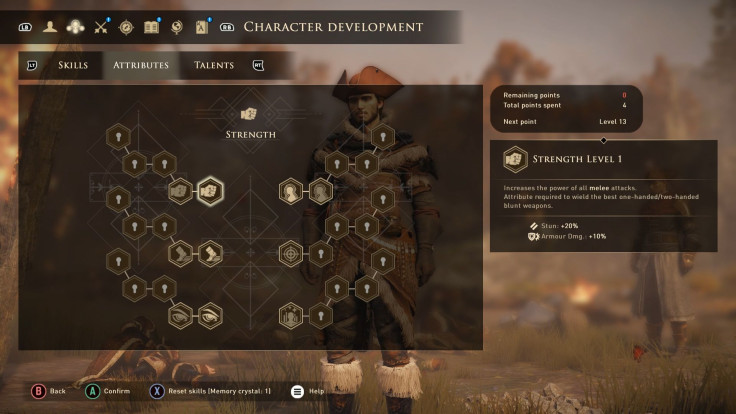With GreedFall finally here and players getting to immerse themselves in Spiders’ most notable role-playing title to date, it’s time to take a look at some of the character systems that makes the game such an in-depth and engrossing RPG. Instead of your usual skills and stats tab that goes hand in hand with most of the RPGs you play, GreedFall features a unique trio of systems that enable you to fine-tune your character and mold it to your own distinct play style. These three systems are the Skills tree, the Attributes tree and the Talent tree.
While the Skills tree is self-explanatory in its overall design, there’s some more in-depth tinkering to be found within the latter two. Each tree allows you to form the core of your character, while the Skills are there to provide you with the associated enhancements for your unique character traits.
Attributes
The Attributes tree is what you’d usually call the stats, but they’re implemented differently from what is typically found in other RPG mechanics. First off, each level of these Attributes also acts as tiers for various equipment, and as such you’d do well to try and look for weapons and armor that fit what you’re going for. Unlike the Skills tree, which earns you a point in every character level, you only get points for Attributes every three levels, so make sure to figure out your play style in advance.
- Strength – pretty self-explanatory, though in the case of GreedFall it should be noted that Strength only increases your overall damage with one-handed and two-handed blunt and heavy weapons like axes and clubs. Every point taken also increases your Stun percentage with those weapons, as well as adds a percentage for Armor damage. Tougher enemies usually rely on a ton of armor, so it’s better to always take a point in this just so you can wield even the most basic clubs and axes for whittling armor down. You can, however, forego this entirely with several levels of the Stasis skill under Magic, as higher versions of it melt enemy armor while the enemy is immobilized.
- Agility – this Attribute is what you’re going to most likely go for in terms of regular melee weapons in GreedFall, as this is the one that increases physical melee damage and Fury generation. It also allows you to equip one-handed and two-handed swords, which are what you’ll most likely use for melee attacks regularly across your first playthrough. Each level of Agility adds a percentage of Physical damage, as well as Fury generation, which is what you use for those powerful special attacks. Investing in this affects all damage inflicted by all melee weapons, so if you’re looking to purely increase your damage, even with blunt weapons, you should take points in Agility.
- Mental Power – this Attribute allows you to wield rings, which are what you use in GreedFall for casting spells. It’s important to note that some spells do not require rings; the Stasis ability, for instance, consumes mana with use, but does not require a ring to cast. Rings have basic missile attacks as well as heavy attacks like melee weapons, but they do this from a distance. Each point in Mental power allows you to wear more powerful rings, as well as increase the power of all spells, your Magical damage by a percentage, and your fury generation for rings’ special attacks.
- Endurance – your basic vitality attribute, as each point taken increases your maximum health and overall balance. Balance is an attribute in GreedFall that prevents you from being knocked back or stunned, so it’s worth putting a point or two in here just in case you’re ever swarmed by enemies with no room for dodging. Besides increasing your life points by a direct number and balance by a set percentage with each level, Endurance also allows you to wear heavier armor with each point taken into it. This is a good Attribute to look into if you’re trying to make your character as tanky as possible.
- Accuracy – besides magic, GreedFall’s 17th Century leanings allow for the use of firearms and other alchemical preparations like bombs and other throwables. Accuracy allows you to be adept at both of these things, which is great for technical-based characters. Each point taken allows you to wield the best firearms, as well as increase your regular damage and armor damage with them; this also includes concoctions and other alchemical items you throw at enemies. It may be good to invest even one point in just for better firearms in general, even if you’re not going the technical route.
- Willpower – this Attribute is your go-to for a longer MP bar, as well as better spell duration. Taking points into Willpower also allows you to wear better amulets and necklaces which offer different effects; it’s good to take at least one point in just so you can equip better ones once you have them. Each point taken increases your maximum MP by a direct number and spell effects by duration in seconds.
Taking everything into account, it’s not always better to invest everything into a single Attribute. Taking even a point into Endurance, for instance, allows you to wear better armor, while even a point in Strength could boost your proficiency with blunt weapons for stunning and reducing enemy armor. Try to experiment and mix and match between different Attributes in addition to specializing so that you can strike a good balance between all of them and cover all of your needed bases.
Talents
Talents are a bit more complicated than Attributes, but nevertheless they’re extremely important to properly building your character. In other RPGs, Talents are some of the secondary stats you take, and they’re tiered in such a way for GreedFall that investing into one means you’re committed to a distinct play style. Like the Attributes tree, you do not gain a point for Talents each level, instead giving you one every four levels, so make sure to plan ahead before you invest in them.
- Charisma – your go-to Talent for smooth-talking your way out of situations. Taking points into Charisma turns De Sardet into a real charmer as it increases the chance of success for some dialog choices. Since your relationship with your companions is neatly tied into dialog, this Talent also improves upon your companions’ combat abilities. Finally, it also reduces merchant’s prices for equipment, which is really helpful. Each point taken increases all of the above, but in any case, its best use comes from the success with dialog, as that can save you on quite a few altercations for vastly different outcomes. A great Talent for anyone looking to complete the game as diplomatically as possible.
- Vigor – a somewhat niche Talent that opens up interesting paths to other certain missions, possibly involving stealth. Its main use is for letting you pass certain difficult passages that require balance, as well as increasing your maximum ammo capacity and HP and MP regeneration outside of combat. While its general use case can be debatable, the regeneration part of the talent can save you potions on higher difficulties, so it may be worth looking into in some cases. Having full Vigor also increases your maximum carrying capacity, but then again this can be neglected if you take regular camps for storage and resting.
- Craftsmanship – arguably a Talent every player should try and max out, especially given the benefits. Craftsmanship allows you to craft weapon and armor upgrades, and with higher levels even allows you to recycle equipment without the need for a crafting table, saving you precious inventory space. Every player needs a good armor set, and completing the Craftsmanship node allows you to craft master weapons and armor upgrades. Take a point every now and then just so you can always have the best armor and weapons possible, especially if your route is combat-heavy.
- Science – the go-to Talent if you’re going for a Technical route, since this allows you to brew potions and explosive throwables. While GreedFall can throw you a curveball every now and then by telling you that potions and brews are needed to complete a quest in a non-combative way, you can still buy these potions instead of brewing them. This makes Science a somewhat questionable Talent to take if you have no plans in going Technical at all, but then again there may be worth as you go higher in the node thanks to the bullet-crafting aspect. A must-have for Technical routes, but just something to consider in any other route.
- Lockpicking – another Talent that should be taken at least one level, given how much it can be beneficial in the earlier stages of the game. Lockpicking is also self-explanatory – it lets you pick the simplest of locks. Some doors and chests do not have a key and require lockpicking instead, so it’s well worth it for looting great equipment when you’re starting out. Lockpicking also has some value, as it allows you to see enemy traps; in higher levels, it gives you the ability to walk over them without springing them as well as picking them up for your own use, making it perfect for Technical players.
- Intuition – the final Talent is also the easiest to misunderstand, but when used correctly it can be a great tool to aid you in a diplomatic route. The first part of Intuition allows you to see gathering sites much easier, which it does by extending your vision of said gathering sites. This Talent also increases the number of ingredients and objects you obtain through both gathering and looting, making it great if you’re the kind who likes to pick up everything you see. Its final part is unlocking contextual dialog options, which can be pretty good for completing various missions and quests through diplomacy, as well as opening up other avenues and opportunities.
Talents are a bit more difficult to properly assess, given that there are quite a number of ways you can complete different missions. That said, I’ve found that most of them always allow for certain archetypes; there’s usually a hidden route that you can either bypass with enough Lockpicking or Vigor, a contextual option that allows you to pass successfully without being compromised through Charisma and Intuition, or a weak wall to blow up with the use of Science. If all else fails, there’s still the path of violence, which is always the easiest to do, but the hardest to justify in terms of its consequences. GreedFall has no set path option and there’s always value in your own choices as a player, so experiment with what works best for your own distinct playstyle.
Stay tuned for more guides on GreedFall. Check out my review of GreedFall here.
- Gripping narrative and amazing worldbuilding.
- Well-written characters that are engaging to converse and interact with.
- Believable dialog and writing, factions are grounded and reasoned well.
- Solid combat mechanics ingrained within a deep RPG system.
- Diverse builds allowing for different kinds of play styles.
- Great voice acting.
- Some technical issues when it comes to running on PC.
- Horrid facial animations which can be unintentionally hilarious.
- Forgettable soundtrack and music.


















